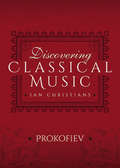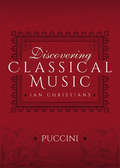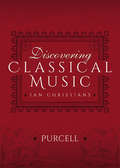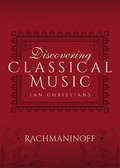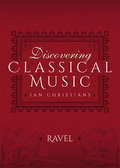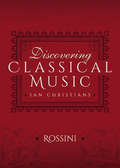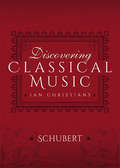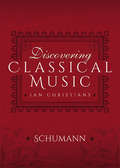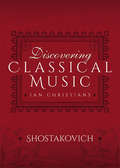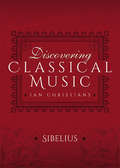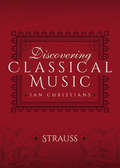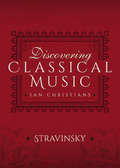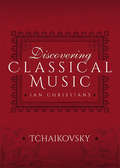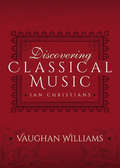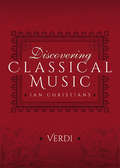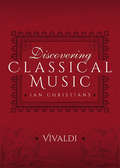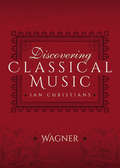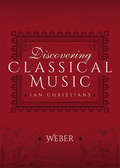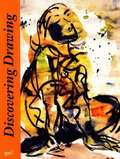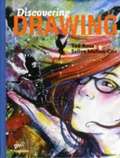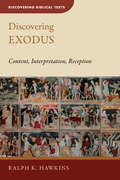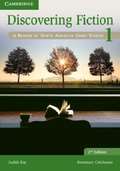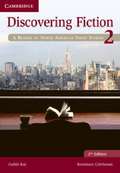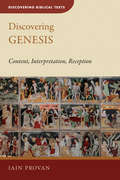- Table View
- List View
Discovering Classical Music: Prokofiev (Discovering Classical Music)
by Ian ChristiansAn introduction to classical music, featuring the life and work of composer Sergei Prokofiev. "I recommend this book wholeheartedly to new music lovers" (Sir Charles Groves, CBE, former conductor of Royal Philharmonic Orchestra).Thanks to Nigel Kennedy and Pavarotti, millions of people have recently discovered that classical music is a highly enjoyable experience, perhaps contrary to their expectations. But the world of classical music can be highly intimidating and confusing. Author Ian Christians, a passionate believer in broadening the interest in classical music, has developed a unique approach, designed to make it as easy as possible for both novices of classical music, as well as those who have already started down the path, to explore with confidence. Discovering Classical Music concentrates on the greatest composers. The author takes you step-by-step into their most approachable music and, in some cases, boldly into some of the greatest works traditionally considered too difficult for newcomers. Rarely does a book offer such potential for continued enjoyment. This volume concentrates on the life, personality and music of Sergei Sergeyevich Prokofiev.
Discovering Classical Music: Puccini (Discovering Classical Music)
by Ian Christians"I recommend this book wholeheartedly to new music lovers" Sir Charles Groves CBE Thanks to Nigel Kennedy and Pavarotti, millions of people have recently discovered that classical music is a highly enjoyable experience, perhaps contrary to their expectations. But the world of classical music can be highly intimidating and confusing. Ian Christians, for many years a passionate believer in broadening the interest in classical music, has developed a unique approach, designed to make it as easy as possible for both newcomers to classical music and those who have started down the path to explore with confidence. Discovering Classical Music concentrates on the greatest composers. The author takes you step-by-step into their most approachable music and, in some cases, boldly into some of the greatest works traditionally considered too difficult for newcomers. Rarely does a book offer such potential for continued enjoyment.This volume concentrates on the life, personality and music of Edward William Elgar.
Discovering Classical Music: Purcell (Discovering Classical Music)
by Ian Christians"I recommend this book wholeheartedly to new music lovers" Sir Charles Groves CBE Thanks to Nigel Kennedy and Pavarotti, millions of people have recently discovered that classical music is a highly enjoyable experience, perhaps contrary to their expectations. But the world of classical music can be highly intimidating and confusing. Ian Christians, for many years a passionate believer in broadening the interest in classical music, has developed a unique approach, designed to make it as easy as possible for both newcomers to classical music and those who have started down the path to explore with confidence. Discovering Classical Music concentrates on the greatest composers. The author takes you step-by-step into their most approachable music and, in some cases, boldly into some of the greatest works traditionally considered too difficult for newcomers. Rarely does a book offer such potential for continued enjoyment.This volume concentrates on the life, personality and music of Edward William Elgar.
Discovering Classical Music: Rachmaninoff (Discovering Classical Music)
by Ian Christians"I recommend this book wholeheartedly to new music lovers" Sir Charles Groves CBE Thanks to Nigel Kennedy and Pavarotti, millions of people have recently discovered that classical music is a highly enjoyable experience, perhaps contrary to their expectations. But the world of classical music can be highly intimidating and confusing. Ian Christians, for many years a passionate believer in broadening the interest in classical music, has developed a unique approach, designed to make it as easy as possible for both newcomers to classical music and those who have started down the path to explore with confidence. Discovering Classical Music concentrates on the greatest composers. The author takes you step-by-step into their most approachable music and, in some cases, boldly into some of the greatest works traditionally considered too difficult for newcomers. Rarely does a book offer such potential for continued enjoyment.This volume concentrates on the life, personality and music of Edward William Elgar.
Discovering Classical Music: Ravel (Discovering Classical Music)
by Ian Christians"I recommend this book wholeheartedly to new music lovers" Sir Charles Groves CBE Thanks to Nigel Kennedy and Pavarotti, millions of people have recently discovered that classical music is a highly enjoyable experience, perhaps contrary to their expectations. But the world of classical music can be highly intimidating and confusing. Ian Christians, for many years a passionate believer in broadening the interest in classical music, has developed a unique approach, designed to make it as easy as possible for both newcomers to classical music and those who have started down the path to explore with confidence. Discovering Classical Music concentrates on the greatest composers. The author takes you step-by-step into their most approachable music and, in some cases, boldly into some of the greatest works traditionally considered too difficult for newcomers. Rarely does a book offer such potential for continued enjoyment.This volume concentrates on the life, personality and music of Edward William Elgar.
Discovering Classical Music: Rossini (Discovering Classical Music)
by Ian Christians"I recommend this book wholeheartedly to new music lovers" Sir Charles Groves CBE Thanks to Nigel Kennedy and Pavarotti, millions of people have recently discovered that classical music is a highly enjoyable experience, perhaps contrary to their expectations. But the world of classical music can be highly intimidating and confusing. Ian Christians, for many years a passionate believer in broadening the interest in classical music, has developed a unique approach, designed to make it as easy as possible for both newcomers to classical music and those who have started down the path to explore with confidence. Discovering Classical Music concentrates on the greatest composers. The author takes you step-by-step into their most approachable music and, in some cases, boldly into some of the greatest works traditionally considered too difficult for newcomers. Rarely does a book offer such potential for continued enjoyment.This volume concentrates on the life, personality and music of Edward William Elgar.
Discovering Classical Music: Schubert (Discovering Classical Music)
by Ian Christians"I recommend this book wholeheartedly to new music lovers" Sir Charles Groves CBE Thanks to Nigel Kennedy and Pavarotti, millions of people have recently discovered that classical music is a highly enjoyable experience, perhaps contrary to their expectations. But the world of classical music can be highly intimidating and confusing. Ian Christians, for many years a passionate believer in broadening the interest in classical music, has developed a unique approach, designed to make it as easy as possible for both newcomers to classical music and those who have started down the path to explore with confidence. Discovering Classical Music concentrates on the greatest composers. The author takes you step-by-step into their most approachable music and, in some cases, boldly into some of the greatest works traditionally considered too difficult for newcomers. Rarely does a book offer such potential for continued enjoyment.This volume concentrates on the life, personality and music of Edward William Elgar.
Discovering Classical Music: Schumann (Discovering Classical Music)
by Ian Christians"I recommend this book wholeheartedly to new music lovers" Sir Charles Groves CBE Thanks to Nigel Kennedy and Pavarotti, millions of people have recently discovered that classical music is a highly enjoyable experience, perhaps contrary to their expectations. But the world of classical music can be highly intimidating and confusing. Ian Christians, for many years a passionate believer in broadening the interest in classical music, has developed a unique approach, designed to make it as easy as possible for both newcomers to classical music and those who have started down the path to explore with confidence. Discovering Classical Music concentrates on the greatest composers. The author takes you step-by-step into their most approachable music and, in some cases, boldly into some of the greatest works traditionally considered too difficult for newcomers. Rarely does a book offer such potential for continued enjoyment.This volume concentrates on the life, personality and music of Edward William Elgar.
Discovering Classical Music: Shostakovich (Discovering Classical Music)
by Ian Christians"I recommend this book wholeheartedly to new music lovers" Sir Charles Groves CBE Thanks to Nigel Kennedy and Pavarotti, millions of people have recently discovered that classical music is a highly enjoyable experience, perhaps contrary to their expectations. But the world of classical music can be highly intimidating and confusing. Ian Christians, for many years a passionate believer in broadening the interest in classical music, has developed a unique approach, designed to make it as easy as possible for both newcomers to classical music and those who have started down the path to explore with confidence. Discovering Classical Music concentrates on the greatest composers. The author takes you step-by-step into their most approachable music and, in some cases, boldly into some of the greatest works traditionally considered too difficult for newcomers. Rarely does a book offer such potential for continued enjoyment.This volume concentrates on the life, personality and music of Edward William Elgar.
Discovering Classical Music: Sibelius (Discovering Classical Music)
by Ian Christians"I recommend this book wholeheartedly to new music lovers" Sir Charles Groves CBE Thanks to Nigel Kennedy and Pavarotti, millions of people have recently discovered that classical music is a highly enjoyable experience, perhaps contrary to their expectations. But the world of classical music can be highly intimidating and confusing. Ian Christians, for many years a passionate believer in broadening the interest in classical music, has developed a unique approach, designed to make it as easy as possible for both newcomers to classical music and those who have started down the path to explore with confidence. Discovering Classical Music concentrates on the greatest composers. The author takes you step-by-step into their most approachable music and, in some cases, boldly into some of the greatest works traditionally considered too difficult for newcomers. Rarely does a book offer such potential for continued enjoyment.This volume concentrates on the life, personality and music of Edward William Elgar.
Discovering Classical Music: Strauss (Discovering Classical Music)
by Ian Christians"I recommend this book wholeheartedly to new music lovers" Sir Charles Groves CBE Thanks to Nigel Kennedy and Pavarotti, millions of people have recently discovered that classical music is a highly enjoyable experience, perhaps contrary to their expectations. But the world of classical music can be highly intimidating and confusing. Ian Christians, for many years a passionate believer in broadening the interest in classical music, has developed a unique approach, designed to make it as easy as possible for both newcomers to classical music and those who have started down the path to explore with confidence. Discovering Classical Music concentrates on the greatest composers. The author takes you step-by-step into their most approachable music and, in some cases, boldly into some of the greatest works traditionally considered too difficult for newcomers. Rarely does a book offer such potential for continued enjoyment.This volume concentrates on the life, personality and music of Edward William Elgar.
Discovering Classical Music: Stravinsky (Discovering Classical Music)
by Ian Christians"I recommend this book wholeheartedly to new music lovers" Sir Charles Groves CBE Thanks to Nigel Kennedy and Pavarotti, millions of people have recently discovered that classical music is a highly enjoyable experience, perhaps contrary to their expectations. But the world of classical music can be highly intimidating and confusing. Ian Christians, for many years a passionate believer in broadening the interest in classical music, has developed a unique approach, designed to make it as easy as possible for both newcomers to classical music and those who have started down the path to explore with confidence. Discovering Classical Music concentrates on the greatest composers. The author takes you step-by-step into their most approachable music and, in some cases, boldly into some of the greatest works traditionally considered too difficult for newcomers. Rarely does a book offer such potential for continued enjoyment.This volume concentrates on the life, personality and music of Edward William Elgar.
Discovering Classical Music: Tchaikovsky (Discovering Classical Music)
by Ian Christians"I recommend this book wholeheartedly to new music lovers" Sir Charles Groves CBE Thanks to Nigel Kennedy and Pavarotti, millions of people have recently discovered that classical music is a highly enjoyable experience, perhaps contrary to their expectations. But the world of classical music can be highly intimidating and confusing. Ian Christians, for many years a passionate believer in broadening the interest in classical music, has developed a unique approach, designed to make it as easy as possible for both newcomers to classical music and those who have started down the path to explore with confidence. Discovering Classical Music concentrates on the greatest composers. The author takes you step-by-step into their most approachable music and, in some cases, boldly into some of the greatest works traditionally considered too difficult for newcomers. Rarely does a book offer such potential for continued enjoyment.This volume concentrates on the life, personality and music of Edward William Elgar.
Discovering Classical Music: Vaughan Williams (Discovering Classical Music)
by Ian Christians"I recommend this book wholeheartedly to new music lovers" Sir Charles Groves CBE Thanks to Nigel Kennedy and Pavarotti, millions of people have recently discovered that classical music is a highly enjoyable experience, perhaps contrary to their expectations. But the world of classical music can be highly intimidating and confusing. Ian Christians, for many years a passionate believer in broadening the interest in classical music, has developed a unique approach, designed to make it as easy as possible for both newcomers to classical music and those who have started down the path to explore with confidence. Discovering Classical Music concentrates on the greatest composers. The author takes you step-by-step into their most approachable music and, in some cases, boldly into some of the greatest works traditionally considered too difficult for newcomers. Rarely does a book offer such potential for continued enjoyment.This volume concentrates on the life, personality and music of Edward William Elgar.
Discovering Classical Music: Verdi (Discovering Classical Music)
by Ian Christians"I recommend this book wholeheartedly to new music lovers" Sir Charles Groves CBE Thanks to Nigel Kennedy and Pavarotti, millions of people have recently discovered that classical music is a highly enjoyable experience, perhaps contrary to their expectations. But the world of classical music can be highly intimidating and confusing. Ian Christians, for many years a passionate believer in broadening the interest in classical music, has developed a unique approach, designed to make it as easy as possible for both newcomers to classical music and those who have started down the path to explore with confidence. Discovering Classical Music concentrates on the greatest composers. The author takes you step-by-step into their most approachable music and, in some cases, boldly into some of the greatest works traditionally considered too difficult for newcomers. Rarely does a book offer such potential for continued enjoyment.This volume concentrates on the life, personality and music of Edward William Elgar.
Discovering Classical Music: Vivaldi (Discovering Classical Music)
by Ian Christians"I recommend this book wholeheartedly to new music lovers" Sir Charles Groves CBE Thanks to Nigel Kennedy and Pavarotti, millions of people have recently discovered that classical music is a highly enjoyable experience, perhaps contrary to their expectations. But the world of classical music can be highly intimidating and confusing. Ian Christians, for many years a passionate believer in broadening the interest in classical music, has developed a unique approach, designed to make it as easy as possible for both newcomers to classical music and those who have started down the path to explore with confidence. Discovering Classical Music concentrates on the greatest composers. The author takes you step-by-step into their most approachable music and, in some cases, boldly into some of the greatest works traditionally considered too difficult for newcomers. Rarely does a book offer such potential for continued enjoyment.This volume concentrates on the life, personality and music of Edward William Elgar.
Discovering Classical Music: Wagner (Discovering Classical Music)
by Ian Christians"I recommend this book wholeheartedly to new music lovers" Sir Charles Groves CBE Thanks to Nigel Kennedy and Pavarotti, millions of people have recently discovered that classical music is a highly enjoyable experience, perhaps contrary to their expectations. But the world of classical music can be highly intimidating and confusing. Ian Christians, for many years a passionate believer in broadening the interest in classical music, has developed a unique approach, designed to make it as easy as possible for both newcomers to classical music and those who have started down the path to explore with confidence. Discovering Classical Music concentrates on the greatest composers. The author takes you step-by-step into their most approachable music and, in some cases, boldly into some of the greatest works traditionally considered too difficult for newcomers. Rarely does a book offer such potential for continued enjoyment.This volume concentrates on the life, personality and music of Edward William Elgar.
Discovering Classical Music: Weber (Discovering Classical Music)
by Ian Christians"I recommend this book wholeheartedly to new music lovers" Sir Charles Groves CBE Thanks to Nigel Kennedy and Pavarotti, millions of people have recently discovered that classical music is a highly enjoyable experience, perhaps contrary to their expectations. But the world of classical music can be highly intimidating and confusing. Ian Christians, for many years a passionate believer in broadening the interest in classical music, has developed a unique approach, designed to make it as easy as possible for both newcomers to classical music and those who have started down the path to explore with confidence. Discovering Classical Music concentrates on the greatest composers. The author takes you step-by-step into their most approachable music and, in some cases, boldly into some of the greatest works traditionally considered too difficult for newcomers. Rarely does a book offer such potential for continued enjoyment.This volume concentrates on the life, personality and music of Edward William Elgar.
Discovering Drawing
by Ted RoseWith this book, students bridge the gap between art instruction, artistic impression, and personal discovery as they explore all facets of the drawing process. Covers: Exercises, tips and captions enhance student understanding; Techniques and sidebars; Artist biographies and high-interest anecdotes personalize art history and the drawing experience; In-depth artist profiles allow students to examine how contemporary artists view their own work and the creative process.
Discovering Drawing (2nd edition)
by Sallye Mahan-Cox Ted RoseWhat Is Drawing?, Elements and Principles of Design, Basics, Still Life, Drawing Landscapes, The Built Environment, Portraits, The Figure, Drawing Animal, The Expressive Language are explained in ten chapters of this book.
Discovering Exodus: Content, Interpretation, Reception (Discovering Biblical Texts (DBT))
by Ralph K. HawkinsThis concise introduction to the interpretation of the book of Exodus encourages in-depth study of the text and deliberate grappling with related theological and historical questions by providing a critical assessment of key interpreters and interpretative debates. It draws on a range of methodological approaches (author-, text-, and reader-centered) and reflects the growing scholarly attention to the reception history of biblical texts, increasingly viewed as a vital aspect of interpretation rather than an optional extra. Throughout Discovering Exodus, Ralph Hawkins gives strategies for reading the book of Exodus, including archaeological criticism. He also reviews key issues raised by Exodus and connects these issues to questions of how this important Old Testament book should be interpreted today.
Discovering Fiction: A Reader of North American Short Stories 1
by Judith Kay Rosemary GelshenenNorth American short stories enhance students' reading skills, language learning, and enjoyment of literature. Discovering Fiction, Second Edition, Student's Book 1 presents stories with universal appeal to engage students and make them think critically. Among the authors included are O. Henry, William Saroyan, Gwendolyn Brooks, Isaac Asimov, and Sandra Cisneros. Extensive pre-reading activities capture students' interest. Post-reading activities check their comprehension, increase their knowledge of grammar and vocabulary, and provide thought-provoking discussion and writing assignments. Literary term explanations and tasks enhance students' appreciation of literature. In addition, WebQuests take students beyond the reading to expand their knowledge of the topic while building Internet reading skills.
Discovering Fiction: A Reader of North American Short Stories 2, Second Edition
by Judith Kay Rosemary GelshenenEquip students to read and understand authentic short stories with vocabulary, reading, and critical thinking skills.<P> Features:<P> * Classic and contemporary stories give students a thorough background in North American literature.<P> * Every chapter gives students practice in guessing meaning from context, which research shows is one of the most important skills for reading unadapted texts.<P> * Students also learn to think critically, make inferences, discuss what they read, and write responses to the work.
Discovering Genesis: Content, Interpretation, Reception (Discovering Biblical Texts (DBT))
by Iain ProvanConcise, student-friendly introduction to Genesis Iain Provan here offers readers a compact, up-to-date, and student-friendly introduction to the book of Genesis, focusing on its structure, content, theological concerns, key interpretive debates, and historical reception. Drawing on a range of methodological approaches (author-, text-, and reader-centered) as complementary rather than mutually exclusive ways of understanding, Discovering Genesis encourages students to dig deeply into the theological and historical questions raised by the text. It provides a critical assessment of key interpreters and interpretive debates, focusing especially on the reception history of the biblical text, a subject of growing interest to students and scholars of the Bible.
Discovering Genesis: Content, Interpretation, Reception (Discovering Biblical Texts (DBT))
by Iain ProvanConcise, student-friendly introduction to Genesis Iain Provan here offers readers a compact, up-to-date, and student-friendly introduction to the book of Genesis, focusing on its structure, content, theological concerns, key interpretive debates, and historical reception. Drawing on a range of methodological approaches (author-, text-, and reader-centered) as complementary rather than mutually exclusive ways of understanding, Discovering Genesis encourages students to dig deeply into the theological and historical questions raised by the text. It provides a critical assessment of key interpreters and interpretive debates, focusing especially on the reception history of the biblical text, a subject of growing interest to students and scholars of the Bible.
